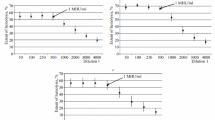Abstract
IT was noticed by Lubinski and Portnuff1 and others that heat at 50° C. made Rh-positive cells suspended in saline become ‘Rh-negative’. Hubinont2 confirmed this observation and pointed out that Rh-substance could be demonstrated in the supernatant saline by inhibition tests. It seemed that these observations might form the basis of a method for preparing anti-Rh sera in animals, if the extracted material were antigenic.
Similar content being viewed by others
References
Lubinski, H. H., and Portnuff, J. C., J. Lab. Clin. Med., 32, 178 (1947).
Hubinont, P. O., Nature, 161, 642 (1948).
Author information
Authors and Affiliations
Rights and permissions
About this article
Cite this article
MURRAY, J., CLARK, E. Production of Anti-Rh in Guinea Pigs from Human Erythrocyte Extracts. Nature 169, 886–887 (1952). https://doi.org/10.1038/169886b0
Issue Date:
DOI: https://doi.org/10.1038/169886b0
- Springer Nature Limited
This article is cited by
-
Immuntoleranz gegen Blutgruppenantigene im Tierexperiment
Archiv f�r Gyn�kologie (1969)
-
Problematische Rhesusausschl�sse
Deutsche Zeitschrift f�r die Gesamte Gerichtliche Medizin (1967)
-
The Quantitative Relationship of the Rh-like (LW) and D Antigens of Human Erythrocytes
Nature (1966)
-
The First Human Blood, ---/---, which Lacks the ‘D-like’ Antigen
Nature (1962)
-
Presence of ‘D-like’ Antigens on Various Monkey Red Blood Cells
Nature (1962)





